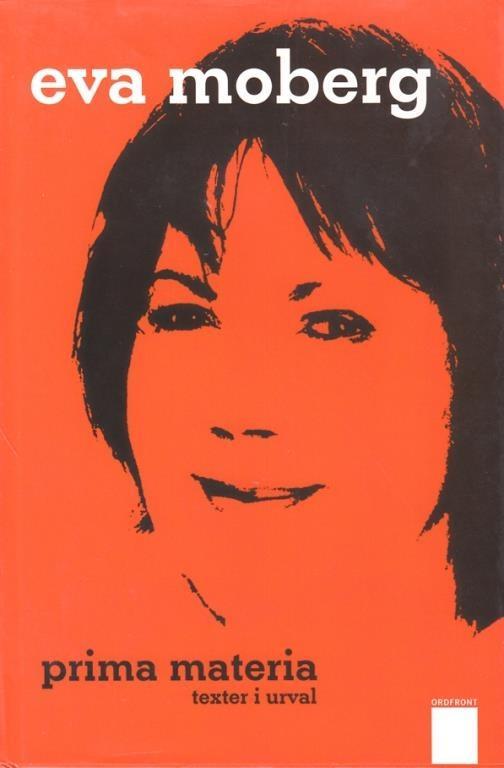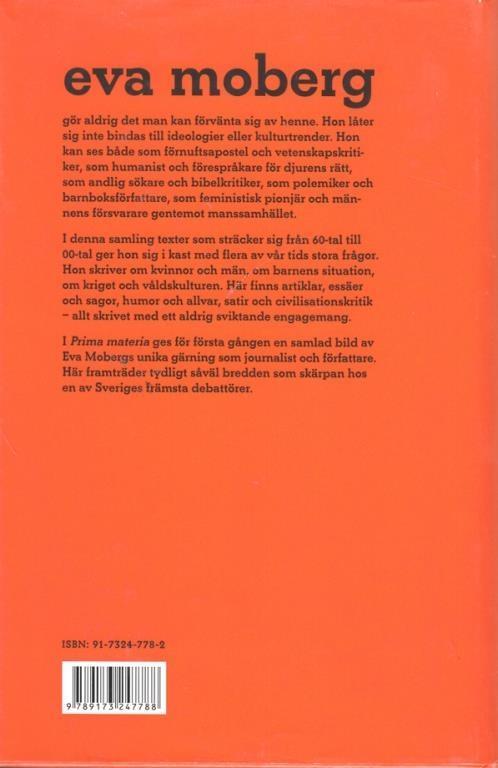S C I E N C E J O U R N A L I S T, A U T H O R ,
F E M I N I S T & P E A C E A C T I V I S T
____________________________________
Eva Moberg - A Feminist to Remember:
An obituary written by the Swedish politician Lena Sommerstad
"If the feminists had succeeded in protecting their history, then women would not have had to repeat the same struggle for gender equality and justice, time after time. That´s what claims Gerda Lerner, American historian claims. In her exposition of feminism's history, The Creation of Feminist Consciousness (1993), she tells us how feminists repeatedly raise the issue of women's rights. But successes have been followed by backlashes, and so the next generation of women has gotten over and over again.
That is what comes to ones mind when Eva Moberg, journalist and writer, has gone out of time, May 22, 2011. Eva Moberg, born 1932, was one of the feminist foregrounds of Swedish feminism. In 1961, she wrote Women's conditional release, a bold article paving the way for the great feminist breakthrough of the late 20th century: the idea of equality of citizenship. But despite the fact that Eva Moberg had such a key role in Swedish women's history, I see someone who is paying attention to her birthday. Even fewer are the reminder of her groundbreaking efforts for Swedish gender equality. The question is why? Swedish women can not afford to forget.
Women are considered to have dual roles in life, wrote Eva Moberg, stamped in Alva Myrdals and Viola Kleyn's pioneering book on Women's Two Roles (1957). The first part concerns home and children. The second role that the woman can "choose" applies to professional work. The problem, Eva Moberg said, is that as long as women accept the idea of double roles, their release remains conditional. Women's liberation requires that not only women but also men take on dual roles. Eva Moberg wanted to talk about "human roles". Being a person holds an obvious responsibility for children. To take care of the children is a moral obligation for both women and men, Moberg said.
Eva Moberg's article aroused a violent debate. But her vision became reality. Ten years after the release of Women's conditional release, the Special Tax Reform was implemented, a milestone in the struggle for women's economic independence. Then followed the parental insurance, the gender equality law and the extension of preschool. Liberals and Social Democrats agreed on a welfare model that became known worldwide because it was assumed that men and women would share homework and employment equally. It was unique at that time and is still far from obvious in modern industrialized countries.
Those who today read Eva Moberg's article will find that her observations have not yet been lost in actuality. On the contrary. Even though women in today's Sweden rarely live as housewives in financial dependence on their men, it is the gender role pattern that she is unquestionably acquainted with. The model of the woman's dual roles, as it appears today, is that women usually respond to home work and often work part-time, while almost all men work fulltime. Among the Swedish children in Sweden today, 40 per cent work part-time. Toddler papers, on the other hand, work most of all men.
When Eva Moberg raised the voice at the beginning of the 1960s, it was to arouse debate in a society where many felt that women's liberation was largely achieved. Only a few details remained.
Today, the situation is not completely different. Forty years after the major gender equality reforms, it is noticeably quiet in the gender equality debate. There is, as in the early 1960s, no organized opposition to the idea that women should have the same opportunities and the same rights as men. Yet, women still continue to perform the bulk of society's unpaid work. Women's conditional release consists.
Eva Moberg's significance for Swedish gender equality debate can hardly be overestimated. A cheerful reminder of how her argument once flashed is Tage Danielssons little poem:
I jämlikhetens namn bör det väl gälla,
att kvinnors jobb är lika bra som mäns.
Men högre får det heller inte smälla.
Då får det vara nog. Det finns en gräns.
Nu blir ju jämlikheten bara värre.
Jag önskar Eva Moberg var en herre.


Prima materia
Few debaters and writers in Sweden can show such a width in the writing as Eva Moberg. She has both width and depth. She is knowledgeable - - - dares to express her opinions even if they are not politically and culturally correct.
Agneta Wågman in Nerikes Allehanda
------
"Prima materia" is worn very far by the author's straight talks, sound argumentation, great affair and ability to dismantle world-political mechanisms at a firm and reasonable level.
Alexandra Ahndoril in Gothenburg Post
------
"... a cheeky and courageous debutor ... as refreshing as a cold demolition ... Her disrespect is great, as does her humility towards humanity. At a time when the spell spreads out and the young journalists' greatest dream is to become the program leader On television her texts are a useful salt. "
Åke Leijonhufvud in Sydsvenska Dagbladet
________________________________________________
Read Eva Mobergs article in Dagens Nyheter
PUBLISHED 1994-11-02 in daily Dagens Nyheter